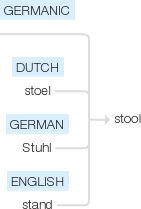Stool
Old English, of Germanic origin; related to Dutch stoel, German Stuhl, also to stand. Current senses of the verb date from the late 18th century.
wiktionary
From Middle English stool, stole, stol, from Old English stōl(“chair, seat, throne”), from Proto-West Germanic *stōl, from Proto-Germanic *stōlaz(“chair”) (compare West Frisian stoel, Dutch stoel, German Stuhl, Swedish/Norwegian/Danish stol, Finnish tuoli, Estonian tool), from Proto-Indo-European *stoh₂los (compare Lithuanian stálas, Russian стол(stol, “table”), Russian стул(stul, “chair”), Serbo-Croatian stol(“table”), Slovene stol(“chair”), Albanian kështallë(“crutch”), Ancient Greek στήλη(stḗlē, “block of stone used as a prop or buttress to a wall”)), from *steh₂-(“to stand”). More at stand.
The medical use derives from sense 2 (seat used for defecation).
Latin stolo. See stolon.
etymonline
stool (n.)
Old English stol "seat for one person," from Proto-Germanic *stōla- (source also of Old Frisian stol, Old Norse stoll, Old High German stuol, German Stuhl "seat," Gothic stols "high seat, throne"), from PIE *sta-lo-, locative of root *sta- "to stand, make or be firm."(source also of Lithuanian pa-stolas "stand," Old Church Slavonic stolu "stool").
Originally used of thrones (as in cynestol "royal seat, throne"); decline in sense began with adoption of chair (n.) from French, which relegated stool to small seats without arms or backs, then to "privy" (early 15c.) and thence to "bowel movement" (1530s).
